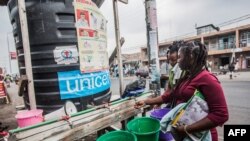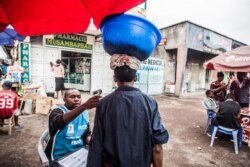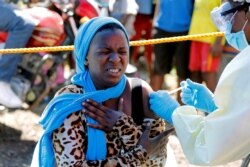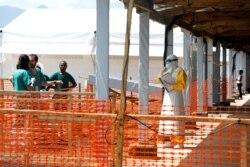Deo Bakulu has been washing his hands every chance he gets since Ebola reached eastern Democratic Republic of Congo's main city of Goma last month.
But the washing station set up by local authorities near his home is only open from 8 a.m. to 6 p.m., from Monday through Saturday, and he doesn't have running water.
"Does Ebola only spread during the day?" he asked ironically as a health official at a different station aimed an infrared thermometer at his temple. "What about on Sundays?"
Goma, a city of nearly 2 million people, is on high alert after the first transmission of the virus within it was confirmed last week. That raised fears the outbreak could spread within the densely-populated city and beyond via its border with Rwanda and the international airport.
A gold miner carried the virus from the epicenter of the epidemic, which is several hundred kilometers to the north. He spent a week at home ill with his wife and 10 children before being transferred to hospital, where he died the next day. His wife and daughter then tested positive for the disease.
Goma has had time to get ready for Ebola, given a nearly year-long head start as the disease raged near the cities of Beni and Butembo. Most residents appear to have taken the latest developments in stride, queuing up at the dozens of washing stations set up on sidewalks by the government and private businesses and avoiding shaking hands.
Still, there are shortcomings in the preparations, and medics are encountering some of the same suspicion and hostility they have faced in other outbreak hotspots. In the current epidemic, the virus has killed more than 1,800 people, the second-highest toll ever.
Whether health authorities can successfully apply lessons from those hotspots will go a long way toward determining if they can claim an important victory in Goma or if, instead, the epidemic will hurtle toward the grim record of more than 11,300 deaths registered by West Africa's 2014-16 Ebola outbreak.
"The system was there before, which is good, so that we're not starting from scratch," said Kate White, medical emergency manager for French medical charity Medecins Sans Frontieres (MSF). "But it definitely needs to be reinforced and scaled up."
Ebola, a hemorrhagic fever first discovered in Congo in 1976, spreads through direct contact with body fluids and typically kills roughly half of those it infects, although the mortality rate is closer to two-thirds during the current outbreak because many people are not seeking treatment.
Preparation
The three cases in Goma set off a scramble to find and vaccinate more than 800 direct and indirect contacts. As of Tuesday, all but five had been vaccinated, said Tresor Amiri, the World Health Organization's (WHO) vaccination chief in Goma.
Officials were cautiously optimistic about their chances of containing the virus in Goma. No additional cases have been identified, and the miner's wife and daughter are recovering.
"We hope they will become the first people cured in Goma," said Jean-Jacques Muyembe, the head of the Ebola response across Congo, adding their survival would show people that "if you show up for treatment early the chances of survival are relatively good."
The one previous case in Goma led the WHO to declare the outbreak an international health emergency three weeks ago, but it did not result in any further transmission inside Goma.
Authorities chalk up those successes to elaborate preparations since the outbreak was declared last August.
Ferdinand Tangenyi, 23, is one of scores of volunteers going door-to-door with illustrated flipbooks warning against handling bloodied clothes or cleaning up vomit. Public service announcements also run repeatedly on the radio.
At the border with Rwanda, crossed by an estimated 45,000 people each day, travelers have their temperatures taken twice on either side. Rwanda briefly closed the border last week but re-opened it as experts warned the move would encourage illicit crossings.
Officials established protocols to handle cases, which they isolated in a special ward at the main hospital. After two months of construction, a 72-bed center built by MSF exclusively for Ebola received its first suspected cases on Friday.
Threats
But steep challenges remain. On Saturday, relatives of a boy who had been referred to the MSF center from a local hospital with fever and diarrhea showed up to demand he be released.
One male relative threatened to burn the facility down.
"They were right in Butembo," he said, referring to how unidentified assailants torched MSF's treatment center there in February, leading the charity to suspend activities in the city.
"We have had fevers and diarrhea since I was a child," said one female relative. "Why does a fever now equal Ebola?" An MSF official was eventually able to defuse the situation, and the relatives left.
MSF says it is taking additional steps to reassure the population in Goma and avoid the conspiracy theories that have undermined the response near Beni and Butembo. The Goma center, for example, was built with see-through fencing to pre-empt rumors that anything nefarious is happening inside, said Alexis Touchais, the construction manager.
Francine Mulangala, who goes door-to-door informing people about Ebola in the Goma neighborhood where the gold miner lived, said she was also threatened last Friday by more than a dozen people demanding to see his body.
"If anyone gets sick, we are going to kill you," she recalled them saying.
The local government has limited ability to deliver crucial services. Only about 10% of the population has access to running water and many rely on communal latrines. The population is also highly mobile, with many traders crossing into Rwanda every day, some outside the official checkpoint.
One driver of a special Ebola ambulance in Goma, who asked not to be named, said drivers had not been paid in six months.
The provincial health ministry, which employs the drivers, could not be reached for comment.
Many residents said they were eager to be vaccinated, but could not be because only those exposed to Ebola patients or their contacts are currently eligible. A decision on whether to deploy a second vaccine that would cover a wider population has been bogged down by wrangling inside the Congolese government.
"The population accepts that Ebola is real," said Joseph Mumbere, a money changer. "But it is very hard to get the vaccine."








